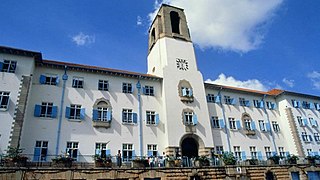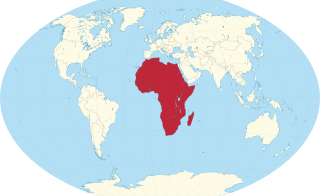
Sub-Saharan Africa is the area and regions of the continent of Africa that lie south of the Sahara. These include Central Africa, East Africa, Southern Africa, and West Africa. Geopolitically, in addition to the African countries and territories that are situated fully in that specified region, the term may also include polities that only have part of their territory located in that region, per the definition of the United Nations (UN). This is considered a non-standardized geographical region with the number of countries included varying from 46 to 48 depending on the organization describing the region. The African Union (AU) uses a different regional breakdown, recognizing all 55 member states on the continent—grouping them into five distinct and standard regions.

HIV/AIDS originated in Africa during early 20th century and is a major public health concern and cause of death in many African countries. AIDS rates varies significantly between countries, though the majority of cases are concentrated in Southern Africa. Although the continent is home to about 15.2 percent of the world's population, more than two-thirds of the total infected worldwide – some 35 million people – were Africans, of whom 15 million have already died. Eastern and Southern Africa alone accounted for an estimate of 60 percent of all people living with HIV and 70 percent of all AIDS deaths in 2011. The countries of Eastern and Southern Africa are most affected, AIDS has raised death rates and lowered life expectancy among adults between the ages of 20 and 49 by about twenty years. Furthermore, the life expectancy in many parts of Africa is declining, largely as a result of the HIV/AIDS epidemic with life-expectancy in some countries reaching as low as thirty-nine years.
Eduard Kukan was a Slovakian politician who served as Minister of Foreign Affairs from 1998 to 2006. He was a candidate in the presidential election held on 3 April 2004, and although pre-election polls had suggested he would come first, he actually came in third behind the eventual President Ivan Gašparovič and former prime minister Vladimír Mečiar, thus preventing him from contesting the run-off. He was elected Member of the European Parliament (MEP) in 2009, a position he held until 2019.

Makerere University, Kampala is Uganda's largest and oldest institution of higher learning, first established as a technical school in 1922. It became an independent national university in 1970. Today, Makerere University is composed of nine colleges and one school offering programmes for about 36,000 undergraduates and 4,000 postgraduates. The main administrative block was gutted by fire in September 2020 and the cause of the fire is yet to be established.
The history of education in Africa can be roughly divided into pre- and post- colonial periods. Since the introduction of formal education to Africa by European colonists, African education, particularly in West and Central Africa, is characterised by both traditional African teachings and European-style schooling systems. The state of education reflects not only the effects of colonialism, but instability resulting from and exacerbated by armed conflicts in many regions of Africa as well as fallout from humanitarian crises such as famine, lack of drinking water, and outbreaks of diseases such as malaria and Ebola, among others. Although the quality of education and the quantity of well-equipped schools and teachers has steadily increased since the onset of the colonial period, there are still evident numerous inequalities in the existing educational systems based on region, economic status, and gender.

Education in Botswana is provided by public schools and private schools. Education in Botswana is governed by the Ministries of Basic Education. and Tertiary, Research Science and Technology Among sub-Saharan African countries, Botswana has one of the highest literacy rates. According to The World Factbook - Central Intelligence Agency as of 2015, 88.5% of the population age 15 and over can read and write in Botswana were respectively literate.

African studies is the study of Africa, especially the continent's cultures and societies. The field includes the study of Africa's history, demography, culture, politics, economy, languages, and religion. A specialist in African studies is often referred to as an "africanist". A key focus of the discipline is to interrogate epistemological approaches, theories and methods in traditional disciplines using a critical lens that inserts African-centred “ways of knowing” and references.

The Uganda Securities Exchange (USE) is the principal stock exchange of Uganda. It was founded in June 1997. The USE is operated under the jurisdiction of Uganda's Capital Markets Authority, which in turn reports to the Bank of Uganda, Uganda's central bank.
David Shapiro is an American economist at the Pennsylvania State University. He joined the Penn State faculty in 1980. He is a leading academic in the field of Economic Demography, specializing in fertility transition in sub-Saharan Africa and in the study of children's schooling in Africa. In addition to research and teaching, Shapiro currently heads the economics honors program and previously served as first Director and then Co-director of Undergraduate Studies in the Department of Economics.

The population of Africa has grown rapidly over the past century and consequently shows a large youth bulge, further reinforced by a low life expectancy of below 50 years in some African countries. Total population as of 2020 is estimated to be more than 1.3 billion, with a growth rate of more than 2.5% p.a. The total fertility rate for Sub-Saharan Africa is 4.7 as of 2018, the highest in the world according to the World Bank. The most populous African country is Nigeria with over 206 million inhabitants as of 2020 and a growth rate of 2.6% p.a.

The Human Rights Measurement Initiative finds that Cameroon is fulfilling 61.0% of what it should be fulfilling for the right to health based on its level of income. When looking at the right to health with respect to children, Cameroon achieves 81.7% of what is expected based on its current income. In regards to the right to health amongst the adult population, the country achieves only 70.5% of what is expected based on the nation's level of income. Cameroon falls into the "very bad" category when evaluating the right to reproductive health because the nation is fulfilling only 30.9% of what the nation is expected to achieve based on the resources (income) it has available.

Although access to water supply and sanitation in sub-Saharan Africa has been steadily improving over the last two decades, the region still lags behind all other developing regions. Access to improved water supply had increased from 49% in 1990 to 68% in 2015, while access to improved sanitation had only risen from 28% to 31% in that same period. Sub-Saharan Africa did not meet the Millennium Development Goals of halving the share of the population without access to safe drinking water and sanitation between 1990 and 2015. There still exists large disparities among sub-Saharan African countries, and between the urban and rural areas. The MDGs set International targets to reduce inadequate Water Sanitation and Hygiene (WASH) coverage and now new targets exist under the Sustainable Development Goals. The MDGs called for halving the proportion of the population without access to adequate water and sanitation, whereas the SDGs call for universal access, require the progressive reduction of inequalities, and include hygiene in addition to water and sanitation. Particularly, Sustainable Development Goal SDG6 focuses on ensuring availability and sustainable management of water and sanitation for all.

During the period of 1965 - 2021, an estimated 440,000 people per year emigrated from Africa; a total number of 17 million migrants within Africa was estimated for 2005. The figure of 0.44 million African emigrants per year pales in comparison to the annual population growth of about 2.6%, indicating that only about 2% of Africa's population growth is compensated for by emigration.
Muni University (MU) is a public multi-campus university in Uganda. It is one of the public universities and degree-awarding institutions in the country, licensed and supervised by the Uganda National Council for Higher Education (UNCHE).
Prostitution in the Central African Republic is legal and commonplace. Procuring or profiting off the prostitution of others is illegal, as is coercing people into prostitution. Punishment is a fine and up to one year in prison, or 5 years if the case involves a minor.
Stephen Robert Isabalija, is a Ugandan civil servant, management professional, accountant, academic and academic administrator. He is the immediate past permanent secretary in the Ministry of Energy and Mineral Development in Uganda, having served in that capacity from November 2016, until his termination on 24 August 2017.
The Near East and South Asia Undergraduate Exchange Program or Near East, South Asia, and Sub-Saharan Africa Undergraduate Exchange Program is an American international student exchange program. It enables students from the Near East, South Asia and Sub-Saharan Africa to attend American universities for a year of study. It is managed by World Learning for the Bureau of Educational and Cultural Affairs of the United States Department of State, and is a part of the Bureau's Global Undergraduate Exchange Program. In the academic year 2013–2014, students who visited the United States under the program came from Algeria, Angola, Bahrain, Bangladesh, Egypt, Ghana, India, Israel, Jordan, Kenya, Lebanon, Libya, Mauritania, Morocco, Mozambique, Nepal, Niger, Oman, the Palestinian Territories, Pakistan, Saudi Arabia, South Africa, Tunisia, Uganda, the United Arab Emirates and Yemen.

DreamWorks Channel, commonly known as DreamWorks, is a pay television network owned and operated by the NBCUniversal International Networks division of NBCUniversal, a subsidiary of Comcast. First launched in Southeast Asia on 1 August 2015, it expanded to the rest of Asia as well as Europe, Africa, Oceania and Latin America. Its programming is dominated by productions from DreamWorks Animation.

Kwesé Sports was a sport website serving Sub-Saharan Africa operated by Econet Media, a subsidiary of Econet Wireless. Kwesé Sports was launched on 4 December 2015 with the announcement made by Econet Wireless founder Strive Masiyiwa, on the social networking site Facebook.
StarTimes is a Chinese electronics and media company in Sub-Saharan Africa.











